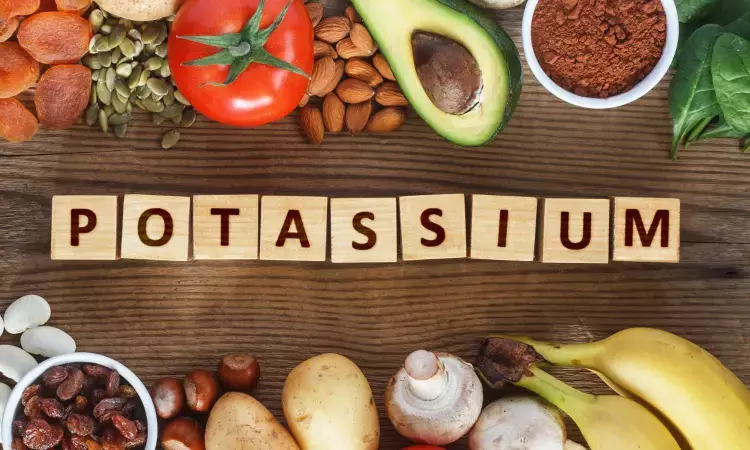- Home
- Medical news & Guidelines
- Anesthesiology
- Cardiology and CTVS
- Critical Care
- Dentistry
- Dermatology
- Diabetes and Endocrinology
- ENT
- Gastroenterology
- Medicine
- Nephrology
- Neurology
- Obstretics-Gynaecology
- Oncology
- Ophthalmology
- Orthopaedics
- Pediatrics-Neonatology
- Psychiatry
- Pulmonology
- Radiology
- Surgery
- Urology
- Laboratory Medicine
- Diet
- Nursing
- Paramedical
- Physiotherapy
- Health news
- Fact Check
- Bone Health Fact Check
- Brain Health Fact Check
- Cancer Related Fact Check
- Child Care Fact Check
- Dental and oral health fact check
- Diabetes and metabolic health fact check
- Diet and Nutrition Fact Check
- Eye and ENT Care Fact Check
- Fitness fact check
- Gut health fact check
- Heart health fact check
- Kidney health fact check
- Medical education fact check
- Men's health fact check
- Respiratory fact check
- Skin and hair care fact check
- Vaccine and Immunization fact check
- Women's health fact check
- AYUSH
- State News
- Andaman and Nicobar Islands
- Andhra Pradesh
- Arunachal Pradesh
- Assam
- Bihar
- Chandigarh
- Chattisgarh
- Dadra and Nagar Haveli
- Daman and Diu
- Delhi
- Goa
- Gujarat
- Haryana
- Himachal Pradesh
- Jammu & Kashmir
- Jharkhand
- Karnataka
- Kerala
- Ladakh
- Lakshadweep
- Madhya Pradesh
- Maharashtra
- Manipur
- Meghalaya
- Mizoram
- Nagaland
- Odisha
- Puducherry
- Punjab
- Rajasthan
- Sikkim
- Tamil Nadu
- Telangana
- Tripura
- Uttar Pradesh
- Uttrakhand
- West Bengal
- Medical Education
- Industry
Consuming high sodium, low potassium diet can increase risk of cognitive decline

Dementia impairs sufferers' ability to remember, think and make decisions to the point where their everyday activities are affected. The condition has become one of the leading causes of death and disability among the elderly globally. As China is not only home to the largest elderly population, but also one of the fastest ageing, dementia poses great economic, health and social challenges for the country.
Dementia is irreversible and there is a lack of effective treatments available, which makes prevention and early detection of age-related cognitive function vital. Research has found that several lifestyle choices are linked to cognitive function; for example, physical activity, diet and sleep. However, the effects of dietary sodium and potassium on cognitive function have not been explored in detail.
In a prospective study published in the KeAi journal Global Transitions, a group of researchers from China looked at the impact of dietary sodium, potassium, sodium to potassium ratio, and salt on the cognitive function of a group of elderly people in China. Participants numbered 4,213 and were aged at least 50 years at baseline. Results are based on cognitive tests and participants'self-reporting.
The research team found that a high intake of sodium (> 5593.2 mg/day) and a high sodium to potassium ratio (> 3.8/day) increased the risk of memory impairment in the elderly. Conversely, higher levels of potassium intake (> 1653.3 mg/day) were associated with a higher cognitive score; the average cognitive test score (13.44 at baseline, total score was 27.00) increased by ~1 point when 1000 mg/day of sodium was replaced with an equal intake of potassium. In addition, the researchers built on previous studies by demonstrating that the effects of dietary sodium, sodium to potassium ratio, and potassium on cognitive function have the potential to be mediated by cardiovascular and cerebrovascular disease (CCVD), while the link between salt and cognitive function can be mediated by sleep.
Although China has attempted to restrict salt and sodium in people's diets for over a decade, the population's intake remains alarmingly high, outstripping many other countries and the World Health Organization's recommendation of a maximum of 1400 mg/day of sodium for people aged 50-79 years and 5 g/day of salt. This high salt intake is commonly accompanied by insufficient consumption of potassium (1499.0 mg/day in this study vs. the Chinese recommended level of 3600 mg/day).
The study's results also confirm previous findings that dietary sodium to potassium ratio could provide a better measure of how these elements impact cognitive function, than looking at separate sodium or potassium values.
Corresponding author, Ai Zhao, adds: "Based on our findings, it is reasonable to suggest that decreasing sodium intake, and properly increasing potassium intake, is beneficial to cognitive function. Given our results, and the nutritional situation of the Chinese, it will be important for future studies to focus on determining the optimal ratio of dietary sodium and potassium in the elderly. In addition, the development of strategies to improve the sodium to potassium ratio in Chinese diets should be a priority."
Reference:
Xiaona Na, Menglu Xi, Yiguo Zhou, Jiaqi Yang, Jian Zhang, Yuandi Xi, Yucheng Yang, Haibing Yang, Ai Zhao, Association of dietary sodium, potassium, sodium/potassium, and salt with objective and subjective cognitive function among the elderly in China: A prospective cohort study, Global Transitions,Volume 4, 2022, https://doi.org/10.1016/j.glt.2022.10.002.
Dr Kamal Kant Kohli-MBBS, DTCD- a chest specialist with more than 30 years of practice and a flair for writing clinical articles, Dr Kamal Kant Kohli joined Medical Dialogues as a Chief Editor of Medical News. Besides writing articles, as an editor, he proofreads and verifies all the medical content published on Medical Dialogues including those coming from journals, studies,medical conferences,guidelines etc. Email: drkohli@medicaldialogues.in. Contact no. 011-43720751


